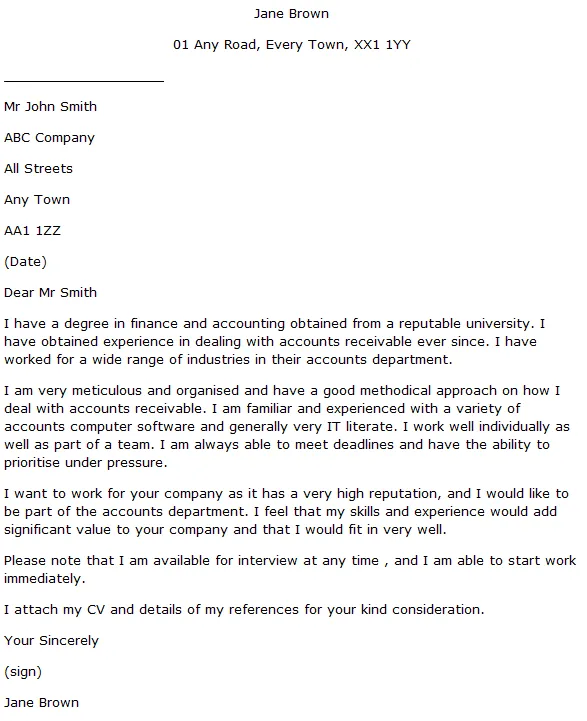Account Receivable Cover Letter: Why You Need One
In the competitive job market, an Account Receivable cover letter is your first chance to make a great impression. It’s more than just a formality it’s your sales pitch, a showcase of your skills, and a way to differentiate yourself from other applicants. A well-crafted cover letter can highlight your qualifications and demonstrate your enthusiasm for the role. It’s an opportunity to connect with the hiring manager on a personal level, conveying your unique value proposition. Without a compelling cover letter, your application might get overlooked, even if your resume is excellent. This document allows you to provide context and personality to your experience. It explains how your background makes you the ideal candidate. It helps you emphasize your passion for the profession and the specific company you’re targeting. A strong cover letter will highlight skills, experience and achievements that prove why you are best suited for the account receivable position.
Understanding the Role of an Account Receivable Specialist
Before you write your cover letter, understand the responsibilities of an Account Receivable Specialist. These professionals are crucial to an organization’s financial health, managing and collecting payments from customers. They track invoices, reconcile accounts, and follow up on overdue payments. They also handle customer inquiries, resolve billing discrepancies, and maintain accurate financial records. The role requires strong organizational skills, attention to detail, and excellent communication abilities. Understanding the specific requirements of the job will allow you to tailor your cover letter to the employer’s needs. Research the companies’ industry, understand their billing process, and review their job description. This targeted approach will significantly increase your chances of securing an interview.
Key Responsibilities of an Account Receivable Specialist
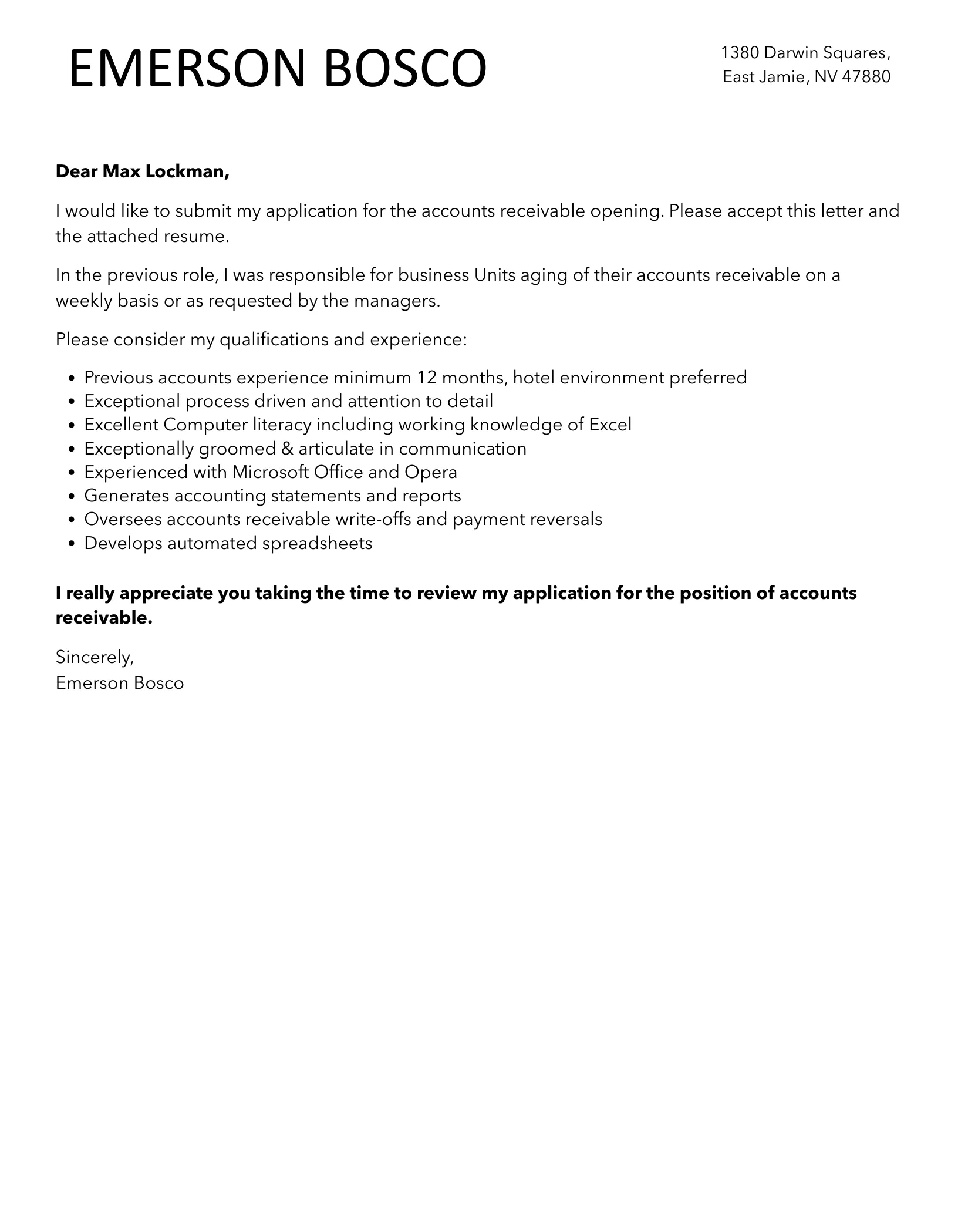
The core duties of an Account Receivable Specialist include several key responsibilities. You will be responsible for generating and sending invoices to customers. Accurate record-keeping is essential, so this must be done with diligence. You will also process payments, manage customer accounts, and handle any related queries. Another important aspect is following up on outstanding payments through phone calls, emails, and letters. You must reconcile accounts, investigate discrepancies, and ensure all financial records are accurate. You should have strong organizational skills to manage multiple accounts simultaneously and be able to meet deadlines. Demonstrate your proficiency in these areas to convince the employer that you are the right fit.
Creating a Strong Account Receivable Cover Letter
Writing a compelling cover letter requires careful planning and execution. Your cover letter should be concise, highlighting your relevant skills and experience. Start with a professional header, including your contact information and the date. Address the letter to the hiring manager, if possible; this shows you’ve done your research. In the opening paragraph, clearly state the position you’re applying for and how you found the opportunity. The body of the letter should detail your qualifications. Use specific examples to demonstrate your accomplishments. Always proofread your cover letter before submitting it to avoid any grammatical errors or typos.
Formatting Your Cover Letter for Success
The format of your cover letter is as important as its content. A well-formatted letter is easy to read and conveys professionalism. Use a standard font such as Times New Roman or Arial, with a font size between 10 and 12 points. Maintain consistent margins and spacing throughout the document. Keep paragraphs concise. Use bullet points to highlight your skills and achievements. Structure your letter logically. Divide it into clear sections: introduction, body paragraphs, and conclusion. Consider using a template, but customize it to reflect your personality and qualifications. Make sure the formatting is consistent with your resume.
Essential Sections to Include in Your Cover Letter
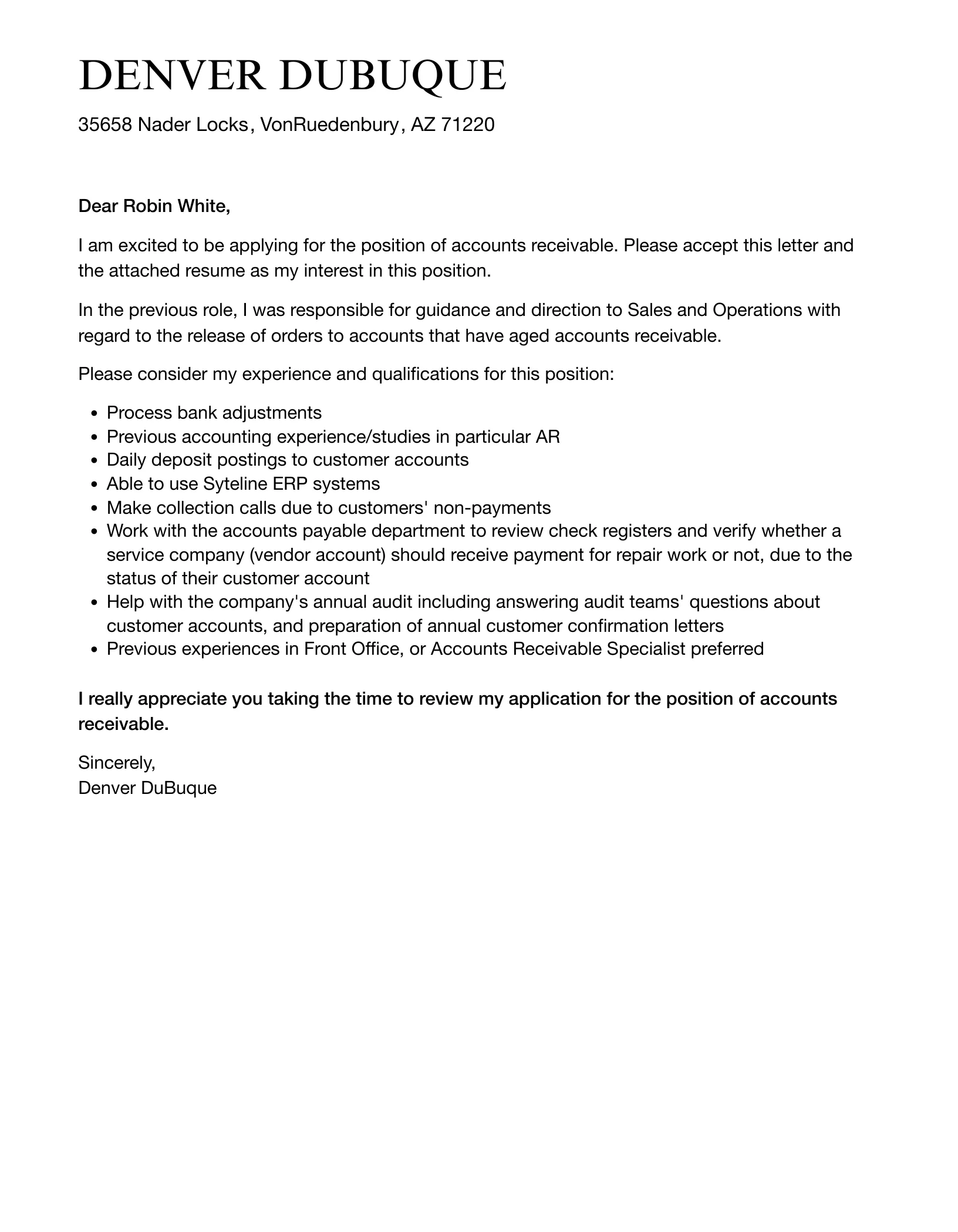
Every Account Receivable cover letter must have certain essential sections. Start with a professional header containing your name, address, phone number, and email. Always include the date and the hiring manager’s name and title. In your opening paragraph, state the position you’re applying for and where you saw the job posting. The body of your letter should detail your relevant skills and experience. Include specific examples of your accomplishments. Demonstrate how you meet the requirements of the job description. Conclude with a strong closing statement that expresses your enthusiasm and thanks the hiring manager. Always include a professional closing, like “Sincerely” or “Best regards”, followed by your name.
Highlighting Your Skills and Experience
Your cover letter is your chance to showcase your relevant skills and experience. Focus on the skills that are most relevant to the Account Receivable position. These often include excellent communication, organizational abilities, attention to detail, and proficiency in accounting software. In the experience section, provide specific examples of your accomplishments. Quantify your achievements whenever possible by using numbers to demonstrate your impact. If you have experience in invoicing, payment processing, or collections, be sure to mention it. If you have any experience with using any accounting software, mention it here as well. Tailor your skills and experience to the specific job description.
Quantifying Your Achievements
To make your cover letter stand out, quantify your achievements. Use numbers to demonstrate the impact you’ve made in previous roles. Instead of saying “Improved collections,” state “Improved collections by 15% in six months.” If you have experience managing a high volume of invoices, specify the number. Quantifying your achievements provides concrete evidence of your skills and abilities. It showcases your ability to make a real difference in the workplace. Always include specific metrics to highlight your contributions. Use these metrics to show your value.
Tailoring Your Cover Letter to the Job Description
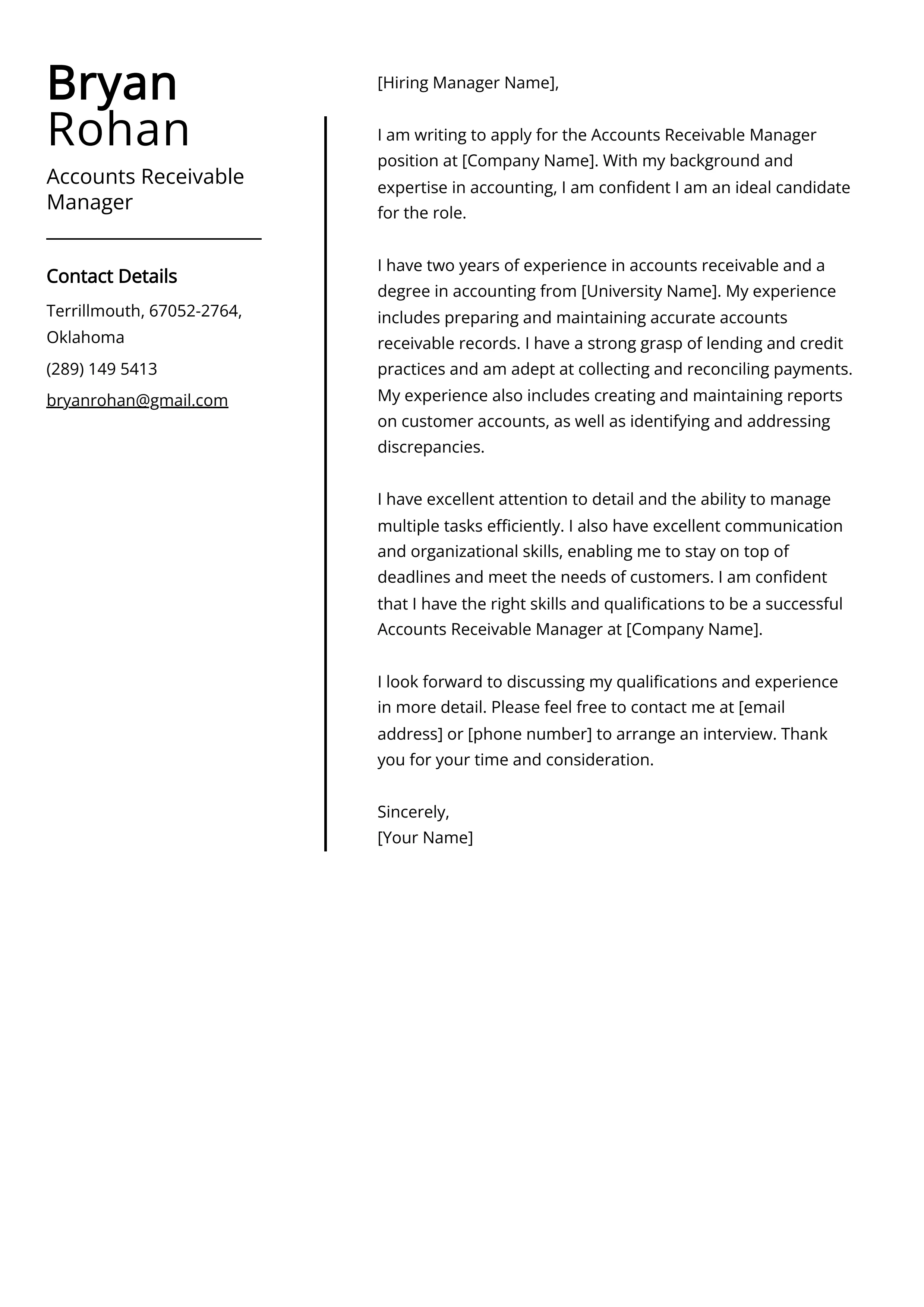
Customizing your cover letter for each job application is crucial for success. Carefully read the job description and identify the key requirements and desired skills. Use the job description as a guide to tailor your cover letter. Highlight the skills and experience that directly align with the employer’s needs. Use keywords from the job description throughout your cover letter to ensure it matches the job requirements. Avoid using a generic cover letter; instead, customize each one to reflect the specific position and company. Demonstrate that you understand the company’s needs and how you can meet them.
Proofreading and Editing Your Cover Letter
Proofreading and editing are essential steps in the cover letter writing process. Errors in grammar, spelling, or punctuation can make a negative impression. Before submitting your letter, carefully review it for any mistakes. Use a spell checker and grammar checker, but don’t rely on them completely. Read the letter aloud to catch any awkward phrasing or flow issues. Have a friend or family member review your cover letter. They can provide a fresh perspective and catch any errors you might have missed. A well-edited cover letter demonstrates your attention to detail and professionalism.
Contact Information and Salutations
Start your cover letter with a professional header that includes your contact information. Include your full name, address, phone number, and a professional email address. Make sure your email address is appropriate and easy to read. In the salutation, address the hiring manager by name, if possible. If you can’t find the hiring manager’s name, use a general salutation such as “Dear Hiring Manager” or “To Whom It May Concern.” End your letter with a professional closing, such as “Sincerely” or “Best regards”, followed by your name. Ensuring your contact information and salutations are accurate and professional sets a good tone for the entire letter.
Writing the Body of Your Cover Letter
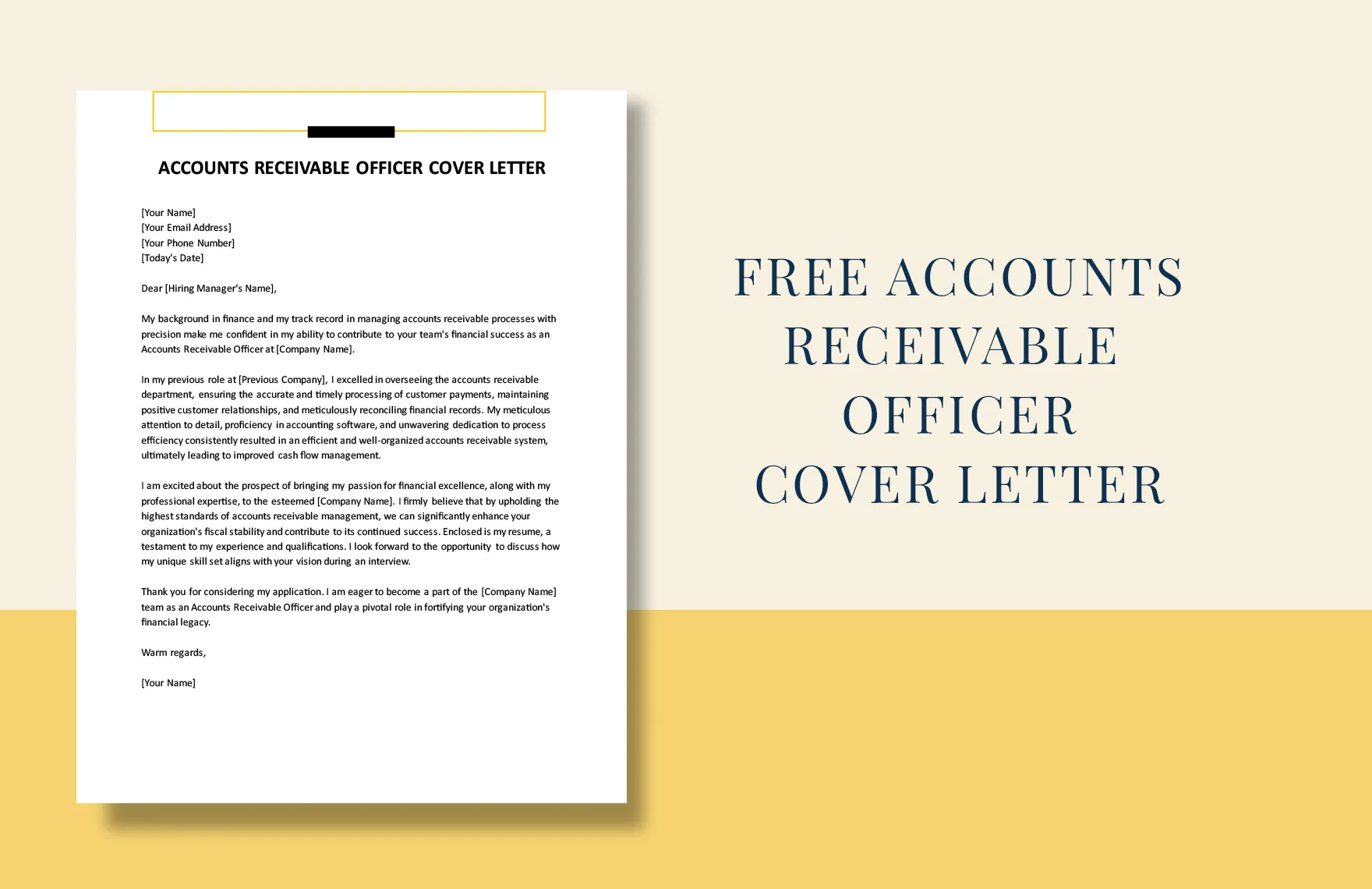
The body of your cover letter is where you showcase your qualifications. Start with a strong opening paragraph that grabs the reader’s attention. State the position you’re applying for and how you found the opportunity. In the subsequent paragraphs, highlight your relevant skills and experience. Use specific examples to demonstrate your accomplishments. Quantify your achievements whenever possible. Show how your skills and experience align with the job requirements. Tailor your cover letter to match the job description. Keep your paragraphs concise and focused. The body of your cover letter should emphasize your skills and qualifications, and prove that you are the best person for the job.
Showcasing Relevant Skills
When showcasing your skills, focus on those most relevant to the Account Receivable role. Highlight your proficiency in communication, organization, and attention to detail. Mention your experience with accounting software, such as QuickBooks or SAP. Demonstrate your ability to reconcile accounts, manage invoices, and process payments. Provide examples of how you’ve used these skills in previous roles. Tailor your skills to match the job description. Avoid listing generic skills that don’t relate to the position. Use action verbs to describe your accomplishments. Emphasize how your skills will contribute to the company’s financial success.
Demonstrating Experience
Your cover letter needs to showcase your relevant experience. Provide specific examples of your accomplishments in previous roles. Describe your responsibilities and the results you achieved. Quantify your achievements whenever possible, such as the amount of invoices processed or the percentage of collection rates. Use the STAR method (Situation, Task, Action, Result) to structure your examples. Explain the situation, the task you faced, the action you took, and the results you achieved. Demonstrate how your experience makes you the ideal candidate for the job. Show that you can handle the responsibilities of the position and contribute to the company’s success.
Closing Your Cover Letter
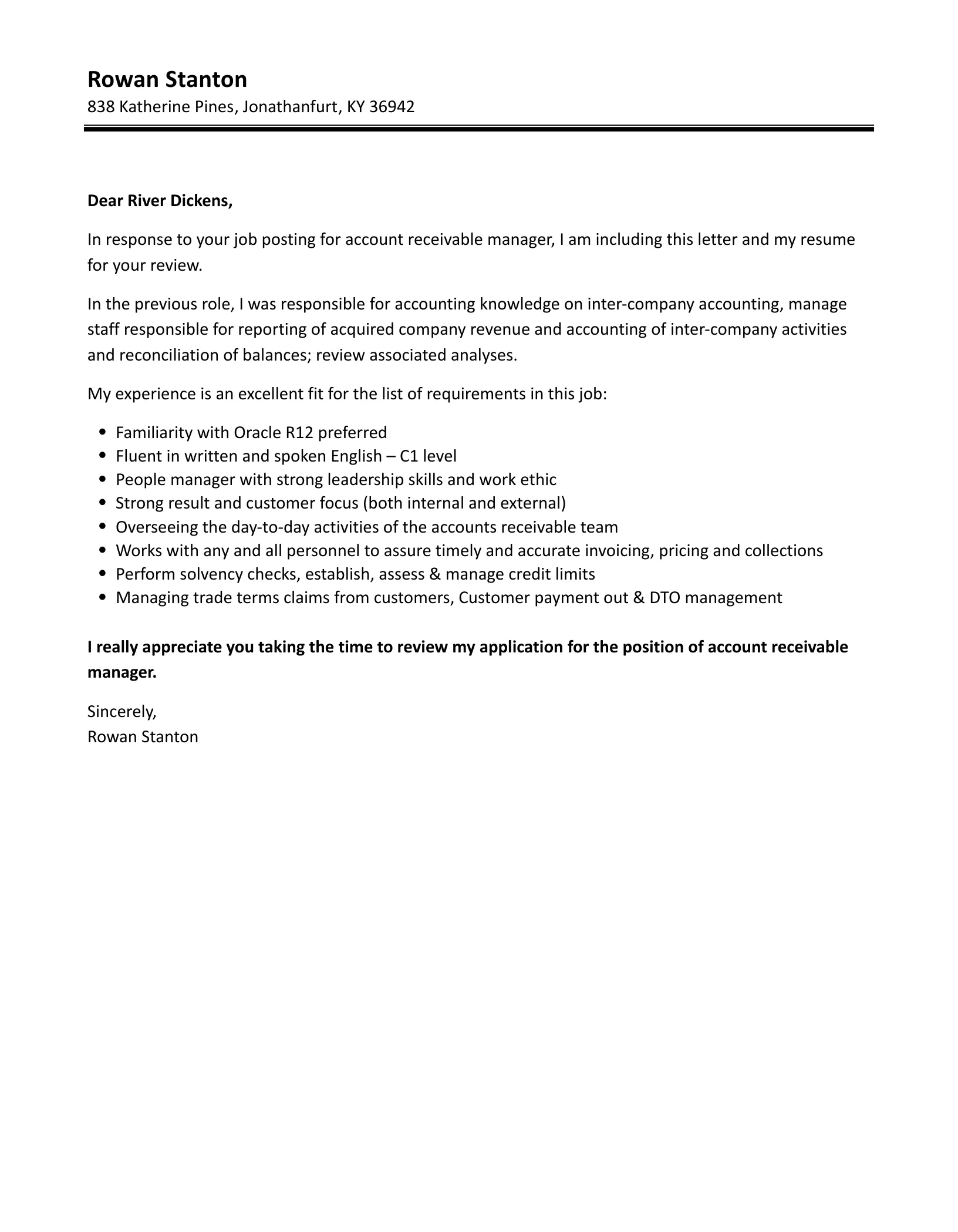
Your closing paragraph should leave a positive impression. Restate your interest in the position and reiterate your qualifications. Express your enthusiasm for the opportunity and the company. Thank the hiring manager for their time and consideration. Include a call to action, such as stating that you look forward to hearing from them soon. Always end with a professional closing, such as “Sincerely” or “Best regards”, followed by your name. Keep your closing concise and focused. The closing should reaffirm your interest and leave a lasting, positive impression.
Examples of Effective Closing Statements
Here are a few examples of effective closing statements to inspire your own. “Thank you for considering my application. I am eager to discuss how my skills and experience can benefit your company.” “I am excited about the opportunity to join your team and am confident I can contribute to your financial success.” “Thank you for your time and consideration. I look forward to hearing from you soon.” “I am enthusiastic about the prospect of working with your team and am eager to apply my skills to the Account Receivable role.” Always tailor your closing statement to the specific job and company.
Tips for Submitting Your Cover Letter
Once you have finalized your cover letter, follow these tips when submitting it. Always submit your cover letter and resume as a single PDF document. This ensures that your formatting remains consistent. Use a clear and professional file name, such as “FirstName_LastName_CoverLetter.pdf”. Double-check the application instructions to make sure you’re submitting your cover letter correctly. Proofread your cover letter one last time before submitting. If applying online, make sure your cover letter is compatible with the applicant tracking system. Following these tips will increase your chances of getting noticed.
Common Mistakes to Avoid
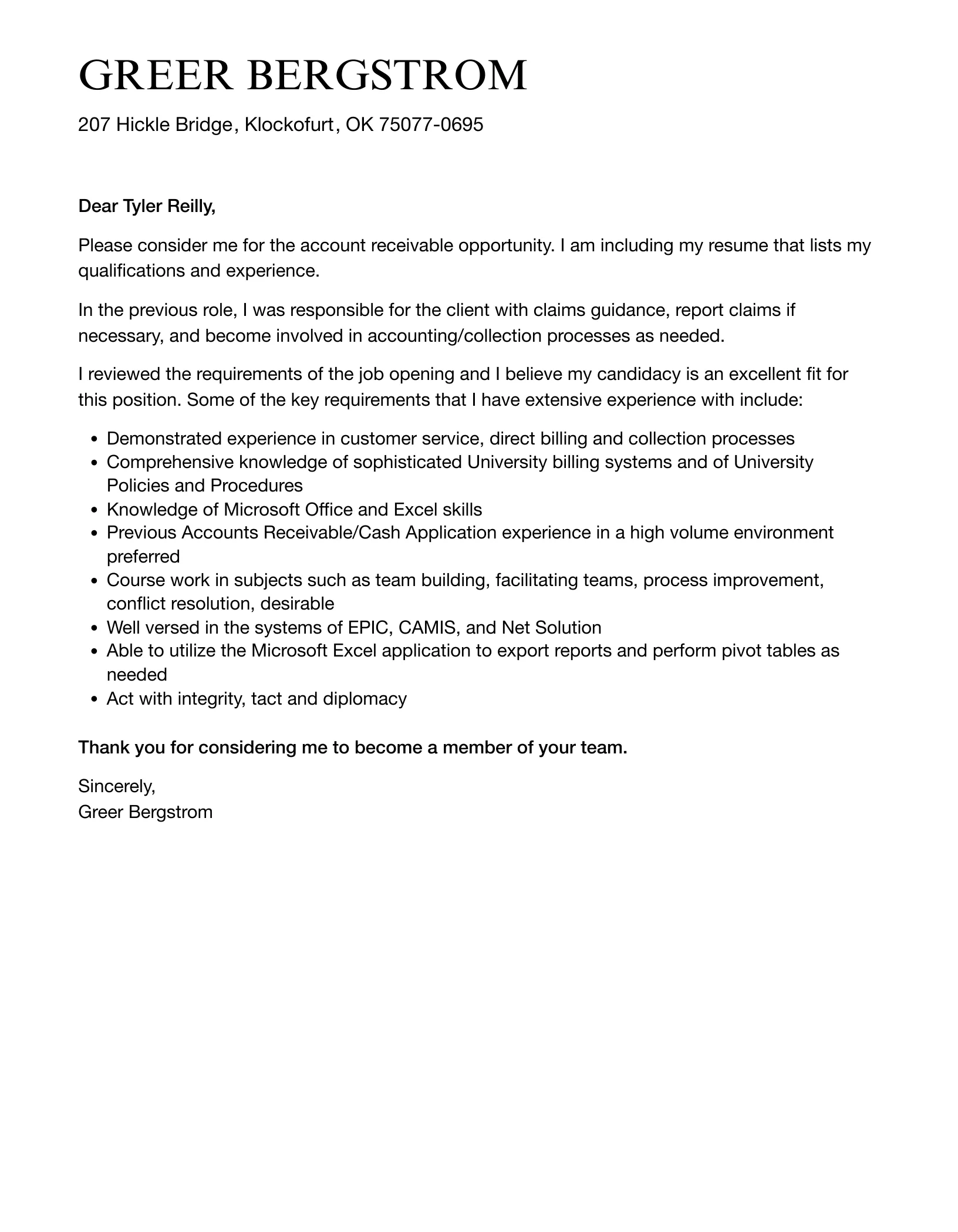
Avoid making these common mistakes to improve your cover letter. Never submit a generic cover letter. Always tailor your letter to the specific job and company. Don’t include irrelevant information or personal details. Proofread for grammar and spelling errors. Avoid using jargon or overly complicated language. Don’t exceed one page. Don’t focus solely on what you want; instead, emphasize how you can help the employer. Don’t forget to include a call to action. By avoiding these mistakes, you can create a cover letter that stands out and gets you hired.
